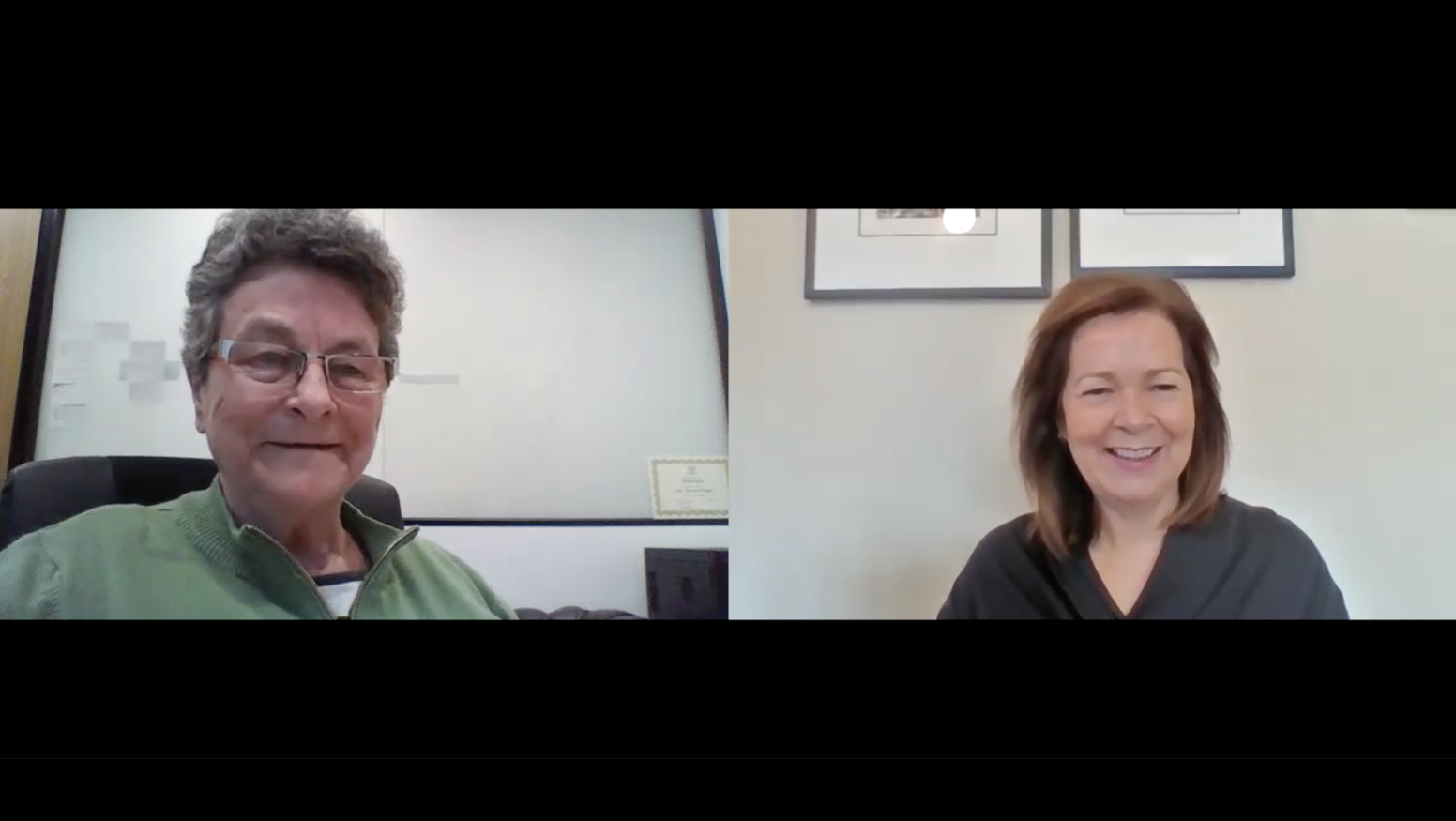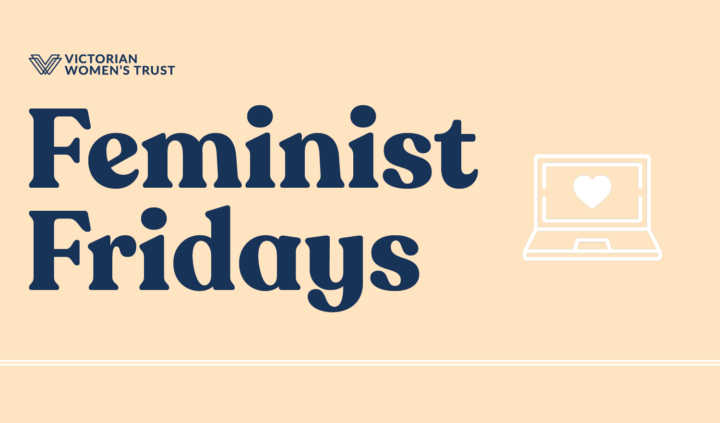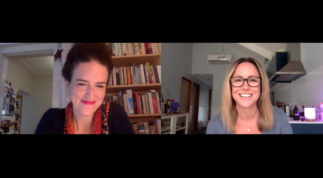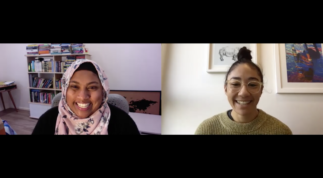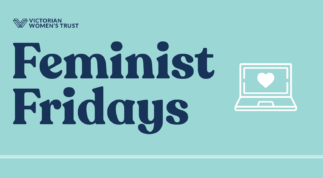The third edition of Feminist Fridays, presented by the Victorian Women’s Trust, went live on Friday 29 May.
Featuring Michele O’Neil (ACTU President) and Mary Crooks AO (Executive Director, Victorian Women’s Trust) discussing critical feminist leadership in a man made world.
Feminist Fridays is fortnightly live stream series, featuring two feminists talking about the issues that matter. Each chat is broadcast live on the Trust Facebook page. Next edition: Friday 12 June 2020, 12pm AEST, speakers soon to be announced.
Catch up on their conversation now, and read the full transcript below:
Transcript:
Mary Crooks AO: Welcome to our third Feminist Friday, from everyone at the Victorian Women’s Trust. But first of all I’d really like to acknowledge our First Nations people as we customly do. I’d like to acknowledge the fact that they have been dispossessed, there’s a great deal of trauma across their communities, but at the same time there has been amazingly resilient leadership and care for this country and supreme grace.
A special welcome to Michele O’Neil, Vice, oh President, I almost said Vice President, I’ve just promoted you Michele, President of the ACTU.
It’s an absolute delight to have you participate in our third Feminist Friday. And Michelle, our viewers might not know, that there’s a couple of things hidden away that we have in common. The first one is that we both share the same hairdresser and I think for about 140 years is that right?
Michele O’Neil: It’s the longest relationship I have ever had Mary. And I’m missing him a lot! I haven’t seen him now for quite a few months, I’ve got a lot longer hair than I had before.
Mary Crooks AO: Yeah well, last time we saw each other. People need to understand that our hairdresser is in lockdown in Queensland. And Michele. he may even be watching, for all we know.
But the second thing we have in common goes way back also, to about 2003. And the Women’s Trust actually made a grant, a significant one back then of about $5500, if I recall to support the Fairwear Campaign. And I know that you were pivotal in that campaign because you were then with the Textiles Union. I remember that there were 300,000 or so outworkers, doing piece work in their homes, and I think overwhelmingly those outworkers were female. But what I have forgotten over the years is what happened to that Fairwear Campaign? And you know what did it lead to? Tell us.
Michele O’Neil: Well Mary, it was such a formative thing, to be part of the Fairwear Campaign. I was the State and then the National Secretary of the Textile Clothing and Footwear Union for many years before I was elected President of the ACTU. And one of the things we did was form with others the Fairwear campaign. And that was about fighting for rights of workers, who are some of the most exploited and lowest paid, mainly women and migrant workers who are sewing our clothes at home here in Australia. And many people didn’t know how terrible the conditions were of those workers.
And as a result of that campaign that involved the union, and many community groups, faith groups, student groups coming together and working over a long period of time together to fight for the rights of these outworkers. We managed to achieve some world leading change in the rights and laws that apply to home based workers here in Australia, that are looked at today as groundbreaking and as a model for what many other countries are looking at doing. Not just for workers who sew, but of course we now see that model of outsourcing work, and people being made to take all the risk that used to be taken by the employer on themselves, spreading to every sector and industry.
So what we won was laws that made it really clear that an outworker that was working at home, regardless of what she was called, it didn’t matter if she was called a contractor or a small business, or an employee, would be entitled to the same wages and conditions as a worker in a factory. And really importantly she could recover money up the supply chain. So what I mean by that is that she might only know the person rocking up in a van, dropping off the work. But if she was not receiving the correct pay and conditions, they could go to the brand, the retailer, the person who ultimately had the power and was manufacturing the goods. And all the way up the supply chain to make sure that they could recover, everything that was owed to them. So it’s a great model.
Mary Crooks AO: It’s a great story and you know maybe we should document that a little bit down the track.
Michele, thinking about women’s leadership in a man’s world…and you know it struck me…wouldn’t it be great right now, wouldn’t it be great to be able to flick a few bad male leaders off the stage? And I love, I don’t know if you’re aware of Tom Gleeson’s show, hard quiz. But you know when he says to failed contestants “Out, get out, off you go”. Wouldn’t it be great? I mean, you know Donald Trump, off you go! Get out. Bolsonaro…
Michele O’Neil: Bolsonaro, off you go out!
Mary Crooks AO: Yeah! Um um
Michele O’Neil: Boris Johnson!
Mary Crooks AO: Dominic Cummings
Michele O’Neil: Off you go, out!
Mary Crooks AO: Kim Jong-Un
Michele O’Neil: Out!
Mary Crooks AO: Off you go! Vlad Putin, off you go!
Michele O’Neil: Out! I think our list is a long list that we’re in common with Mary.
Mary Crooks AO: Yeah and my staff would kill me if we just focused on that. Let’s get onto the question about leadership and especially across the union movement. When I last did a quick stock take, there are so many women occupying significant positions now in the union movement in this country and it strikes me it’s almost like a quiet Revolution that has occurred.
Apart from the wonderful Sharan Burrow leading one of the biggest movements of some you know 180 million people, workers across the world. But right through you know Ged Kearney, you know previously at the ACTU, thinking of Ros McLennan in Queensland, of Jo Schofield United Voice. Everywhere you look now there are some very prominent positions held by women. And then we come to yourself as President of the ACTU and Sally McManus. So it seems to be a quiet revolution, ACTU being headed up as it is now by two women such as yourselves. Can you characterise for us, cogently what’s the significance of your working relationship with Sally? What are the qualities you both bring to the leadership, the duality of that leadership at the ACTU?
Michele O’Neil: Yeah, I don’t know if I would agree with you that it’s been a quiet revolution, when I think about the struggles of women in the union movement for a long time. I think that there’s been both quiet, and some pretty vocal interventions that we’ve made.
But what I’d say about Sally and I, and why it’s a great working relationship, is that first of all we knew each other and trusted each other very well before we both ended up elected into the leadership roles. So there was an established respect and that respect is fundamental to the working relationship now, we trust each other. And I’d characterise it as, we absolutely have each other’s back, so that sense of whatever happens, knowing that the other is there looking out for you, and will have your back is so solid and fundamental to our working together.
The other thing I’d say is that we’ve got some pretty complementary skills, we actually approach things in a bit of a different way. It fits together really well, and we find it pretty easy to navigate that, to work out ‘oh this is what you’re good at you look after that, oh this is what you’re good at you look after that’. So that collaborative approach to backing each other up, understanding what each other is good at, boosting each other up in that.
The other thing I will say, is that we have a lot of laughs, and that’s probably the last thing I’d say Mary. Is that in the sort of work we do, in the movement we’re in and in the world we’re in, you can imagine there are a lot of demands, things move fast. But we manage to find a lot of humour and keep each other going with that as well.
Mary Crooks AO: Lovely. Having eachothers backs is a bit different, to being just about to plant a knife in someone’s back.
Michele O’Neil: True
Mary Crooks AO: Michelle looking then broadly, I mean the ACTU has clearly assumed, it’s always been there it’s a significant institution in our country. More than people realise perhaps. But it seems to me that it has a sharp role in some interesting ways now.
So if I could just turn for instance to young people in this country, during COVID and the way we get out of COVID/post COVID. It seems to me that young people in particular, they’ve taken a massive hit in terms of joblessness. I think it’s even significant that most, a huge proportion of the people who have accessed their superannuation in the last couple of months have been young people.
To go through your 20s in this country over the next several years and to be either jobless or underemployed is a very significant social and economic challenge. And it strikes me that although they might not be union members yet, it strikes me that…who else will speak for young people in the years ahead? The business community won’t, I think by and large, some ngo’s will. But what does the ACTU think currently as far as it’s remit, about giving voice to young workers in the country?
Michele O’Neil: Well you’ve touched on something that’s so important Mary.
The dramatic impact of the pandemic on young workers jobs is plain to see. Because we already had a problem pre COVID-19, where rates of youth unemployment were so much higher, and then the more you go out into regional and rural Australia, the worse it gets again.
We’ve got some towns in Australia, where youth unemployment is at 25-26%. And now we’re seeing young people across the board, unemployment rates hitting 12%. And that’s likely to rise, that’s the horror impact of what’s happening in the economy with job losses at the moment, because the other thing about young people, they are often in insecure work, and they are the first jobs to be let go.
So we think from the ACTU’s perspective, that it’s really important that the union movement is a voice for every worker. And that we do a lot of work trying to make sure that young people know that unions are for them. And that the very best outcome that we can have together as workers is when we stick together with other workers. And that’s the fundamentals of unionism, is that it’s just workers sticking together and looking out for each other.
We have been doing pre-pandemic, quite a lot of different approaches to how you organise younger people. And a lot of that might be about how you use online methods, how you organise in ways…let me take hairdressers for example. A lot of young women, young men as well, work as hairdressers, they work in an environment when they are in a small workplace, they’re often working this close to their boss [signals a short distance with her hands].
And the old idea that the union organiser would come into their workplace and go “Oh hey how are you going? What’s happening?” and that the worker could freely talk about what was happening. And you think, customers and boss all in the one room, it’s just not going to happen. So we’ve had a pilot of the hair stylists association, which is a new union, as part of a larger AWU, trying to organise hairstylists mainly online, and doing a lot of fantastic work reaching people in the online community and building unionism that way.
So what I would say is unions are more important than ever for young people, but we’ve got to come out of this pandemic with plans that are going to do something to turn around youth unemployment. Practical plans that the government don’t have at the moment. Issues around apprenticeships, skills and training, support to make sure that Jobkeeper at the moment would cover every worker, including all those casuals, many of whom are young people working in hospitality, who haven’t worked for the one retailer for 12 months for the one, hospitality and retail really, haven’t worked for the one employer.
Mary Crooks AO: So switching then to another very very significant vulnerable group in the workforce, to women. And you know I think, I think I read the stats show that in the space of one month, I think in April, women’s participation in the workforce dropped from 61% to 58%, men’s dropped from 71% to 69%. So more women are bearing the brunt of the rapid and quite horrific joblessness that the pandemic has caused.
So, and you and I both know that women cop a triple whammy, you know. Their work in the home is unpaid and unequal, disproportionate. They work in sectors that are often poorly paid; very gendered sectors such as nursing and childcare are relatively poorly paid. And there are issues that are holding back their participation around childcare and so on. So, from the ACTU point of view, what’s front and central for you and Sally as you steer the course with a woman’s led outfit?
Michele O’Neil: Well this is one of the reasons why we’ve been focusing on this issue of insecure work Mary. Because we had these fault lines in the labour market and economy before we got into the pandemic, and they were already disproportionately affecting women. So we’ve still got a 14% gender pay gap, and when you look at insecure work we’re the third highest rate of insecure work in the OECD. And who does that hit the hardest? It’s women. And it’s often low paid women because they’re more likely to be in jobs that are insecure jobs.
They don’t know how many shifts or hours they’re going to get week to week or month to month. Impossible to plan your life, and of course that then impacts on all the other responsibilities that women have as well. So when we are now trying to turn the focus of the government and employers about what needs to happen, we are saying at the core of that is two things. It’s about creating more secure jobs, and also about making sure that workers get their fair share of the wealth that Australia’s got.
And we also know that when you look at inequality in Australia, again before we were in COVID-19, that despite years of economic growth that wealth wasn’t being shared fairly. And again, women are very likely to be in circumstances where they have much lesser share of it as lower paid workers. And superannuation, you know, women today retire on half the amount of money in super than men.
So we want to focus on security, what you can do in terms of making sure that every worker is able to access being able to convert if they were originally employed as casual to permanent workers. And that being an automatic right, that they don’t, that we don’t have this rubbish of people being called casuals for years and years. Or contracts; if you look at education, again a whole lot of women in that sector in higher ed where they’re on rolling contracts. I met a woman the other day who had been employed for 12 years, working for the same education institution, doing the same job but never seeing any holiday pay or sick pay. Because it was twelve rolling contracts, now that’s obscene.
And a third of workers now, the majority of [which are] women, have no access to paid sick leave. So we think addressing these issues is really important in terms of women’s work. We’re limited on time, but the other things I’d say is that we don’t talk about what needs to be done for women as a sort of add on, it’s essential to everything we’re looking at in terms of what has to happen coming out of this. To build a fairer, better system so that women are recognised, you’re right, some of the jobs we do are still so under-recognised. If anything we’ve learnt out of COVID-19; the work of childcare workers, teachers, nurses is so critical and way undervalued in our community.
Mary Crooks AO: So Michele, I would feel more relaxed politically if I heard a lot of our male leaders already conceding that childcare, childcare and fairness in childcare and affordable childcare should in fact be front and central to economic recovery. I don’t think I’ve heard any of our leaders talk in those terms yet, I’m hoping that might happen over the next four months. So can we come to the question of our prime minister’s call this week to lay down, lay down your weapons, to lay down the arms. Which I must say, you know pardon my cynicism, but you know it’s interesting language for a start, because it so underscores the combative, belligerent, adversarial politics that has held us back for so long in this country.
So, laying down your arms, I’m sort of reminded you know I think it was actually Winston Churchill who said that ‘politics is a dangerous game and it’s actually more dangerous than in war, because in war you only get killed once’. But it seems to me, so the ACTU is at the table and I think back to the last time something like this happened, of calling for collaboration and calling for consensus. But interestingly the prime minister saying this week ‘but if we don’t get consensus we’ll just do it ourselves anyhow’, which from my own experience of public process and public consultation is a little bit on the tad cynical at the beginning.
But leaving that aside, the accord under Hawke and Keating actually triggered major reforms, not simply tinkering or streamlining industrial relations processes.
So early in the piece the ACTU is coming to the table over the next four months with business and others and the political leadership of the country. What do you and Sally, what do you see as some of the early important assumptions that need to underpin the next four months of collaboration?
Michele O’Neil: Well the first thing I’d say Mary is I agree with you about the weapons. The notion that this is somehow put in that terminology, I don’t accept it. I don’t think that working people have been using weapons in our attempts to win fairness and justice and I wouldn’t characterise it like that, I think it’s a pretty interesting way for the government to do it.
But secondly I’d say it’s not an accord. You rightly describe a historic accord that was about a very broad range of social issues. You know, it includes superannuation, medicare, many other matters that were on the table for discussion. That’s not what this government’s proposed and we reject the notion that that’s the process we’re being in, that’s not the process.
What we are prepared to do though is sit at the table with anyone who’s prepared to respect the voice of working people in what is needed to be done. Because you get better decisions when you understand the impact on people, and that’s our role. Our job is to bring to the table what is in the best interest of working people. Which of course corresponds, I reckon, with what’s in the best interest of our community and then our society. And that’s what we’ll do.
So we will be really using it as a touchstone, if you like, for the discussions of two things. One is, is it going to increase people’s job security for all the reasons I spoke about before, about making sure that we have better quality jobs that people can rely on?
And secondly, whether, it’s about a fairer share for working people. And we think that those things are really important. Looking at fairness, looking at security for all the discussions. We want to see changes that are going to lead to long term change, that are actually, mean that we have a more just and fair approach to how people are treated at work and their rights at work. That’s what we’re going to go in with.
We’ll be open, we’ll listen, but we also are very clear that we will be there in the interest of workers and have their back. So it’s not going to be an exercise in reduced rights and conditions, because we think that already in Australia we’ve got a problem with workers often not having enough rights and conditions. Particularly those that are in insecure work.
So we’re going to be trying to improve that, and if we can, great. If not, there’s no harm in talking. And if the government decide to move on with things out of that exercise that havent been agreed, then we’ll strongly fight them and oppose them. But we’ll see how it goes!
Mary Crooks AO: Michele, just numerically, what’s your sense of how many participants are going to be involved across business and the union movement and government. How many, how many people are we talking about in that form of collaboration?
Michele O’Neil: Yeah, those discussions are still happening Mary. So, at the moment that discussion about the size of the working groups, there’s five of them, and who’s going to be on them, is still happening. Ultimately the government is facilitating, you know, convening these discussions. We’re putting forward our views but we’ll see where it gets to in the next few days.
Mary Crooks AO: Yep ok. Michele we do need to draw it to a close, sadly. But can I just ask, you know, apart from starting with our hairdressing question – but what have you been doing to keep yourself sane over the last three months?
Michele O’Neil: Ah, mainly my dog Lola has been my saviour. She’s a very gorgeous warm hearted spoodle. And taking her for walks has been really the most important mental health and physical health thing I’ve been able to do.
Mary Crooks AO: Yes but Michele, they’re not great conversationalists, dogs.
Michele O’Neil: Oh no she’s great, like seriously she doesn’t argue back. So you know, I don’t have to negotiate with her Mary. She just accepts absolutely everything I say and she still loves me, loves me completely.
Mary Crooks AO: Oh I get it, yes.
Michele O’Neil: So you know, it’s the perfect, she’s perfect for it. So what about you, what have you done?
Mary Crooks AO: Yeah look, I’m taking my dog. I mean, my phone told me the other day that I’m walking more this year than I was this time last year, my smartphone. I thought, was not very smart because I knew that. I know that. But yeah, I think that kind of exercise and keeping in touch with people. You know, that thing doesn’t alter that you really do need to keep feeding off one another and keep supporting one another, yeah.
Michele O’Neil: Yeah, I think that’s so true. And of course, you know, one of the things we’re really aware of is that we’re not through this. So people staying safe, I mean, a big role of what we’ve done in the union movement has been promoting the need for people to be absolutely safe and follow experts advice. Whether at workplaces, and in the reopening up, that’s another key element of what we’re going to be making sure that workers aren’t put in unsafe positions.
Mary Crooks AO: Yeah, it’s just another, it’s another big demand. We’re doing the same, trying to work through, from the Women’s Trust, how we might return to our little old office. It’s not easy, and you’re right, it’s a long haul. So we’ll need to keep looking out for one another. So Michele, look, thank you in a busy schedule for coming on board with our third Feminist Friday. And you need to stay well. Please pass on our esteem and regard for the job Sally is doing, as well. And may your professional and personal relationship be as productive as it can, because we need you there to be honest. So thank you again for your time and that’s it for our third Feminist Friday. We have another one, the fourth one, coming on the 12th of June so stay with us. Follow the Women’s Trust in the meantime for all the details about Feminist Friday’s. We hope that you’re enjoying them. Support us, help us with our end of financial year. Everything like that makes a difference and enables us to do this kind of initiative. So thank you and have a great weekend. Bye.
Michele O’Neil: Thanks, stay strong everybody. Thanks Mary.
Mary Crooks AO: Bye bye.
The next Feminist Fridays will be broadcast at 12pm AEST on Friday 12 June 2020 on the Trust Facebook page.
